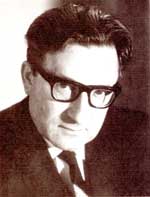(Died: December 18, 2010)
Interests: Philosophy of Science, Relativity Age: 95
Max Jammer (born 1915) is an Israeli physicist and philosopher of physics. He was born in Berlin, Germany.
He studied physics, philosophy and history of Science, first at the University of Vienna, and then from 1935 at the Hebrew University of Jerusalem, where he received a PhD in experimental physics in 1942. After serving in the British Army for the rest of the war, Jammer returned to Hebrew University, where he lectured on the history and philosophy of science, before moving in 1952 to Harvard University. He subsequently became a lecturer there and a close colleague of Albert Einstein at Princeton University. He taught at Harvard, the University of Oklahoma, and Boston University, before in 1956 establishing the Department and becoming Professor of Physics at Bar-Ilan University in Israel, where he later also served as President and Rector. He also co-founded the Institute for Philosophy of Science at Tel Aviv University, and has been President of the Association for the Advancement for Science in Israel. He was Visiting Professor at the Swiss Federal Institute of Technology in Z?rich, the University of G?ttingen, the Institut Henri Poincar?, Columbia University, the Catholic University of America in Washington, D. C., and other universities in the United States and Canada.
Award
Awards received by Jammer include the 2007 Abraham Pais Prize for History of Physics, awarded by the American Physical Society, the Monograph Prize of the American Academy of Arts and Sciences, a prize for 'an outstanding book on theology and natural sciences' from the Templeton Foundation, the Israel Prize, and the 2003 EMET Prize awarded by the Prime Minister of Israel. - Wikipedia
Israeli physicist. He was born in Berlin where his elementary education at the Jewish community school and secondary education gave him a grounding in classics of lasting value in his career. He studied philosophy, mathematics, and physics in Vienna (1933?35) before immigrating to Palestine where he gained a Ph.D. in molecular spectroscopy from the Hebrew University of Jerusalem (1942) preparatory to specializing in the philosophy of science. After World War II service in the British Army, he was a member of Haganah's intelligence unit during the War of Independence and was wounded during the battle for Jerusalem. He became a post-doctoral fellow and then lecturer at Harvard University (1951?57) and professor at the University of Oklahoma. He returned to Israel to establish and build a highly successful physics department specializing in solid state physics at the newly founded Bar-Ilan University in Ramat Gan. He became rector (1962) and president of the university (1967?68). Jammer's research has concerned the history and philosophy of science in the classical world, the Middle Ages and the modern era. He is especially interested in the history and philosophy of quantum mechanics. In retirement he continued his studies of the conceptual foundations of quantum mechanics, the true nature of mass (inertia), and an analysis of Einstein's philosophy of religion. His many honors include the Prize of the American Academy of Arts and Sciences (1961), the Israel Prize for the history of science (1984), and election as president of the Association for the Advancement of Science in Israel. He served as a member of many key advisory committees to the Israel government on science and higher education. He was a visiting professor at leading universities in the U.S. and New Zealand. His research and thinking are recorded in a series of very successful books, published by major universities, and translated into many languages. These include The History of Science (1950) and Concepts of Space ? the History of Theories of Space in Physics (1954) which greatly interested Einstein and for which he wrote a preface. He wrote Concepts of Force ? a Study in the Foundations of Dynamics (1957), Concepts of Mass in Classical and Modern Physics (1961) and The Conceptual Development of Quantum Mechanics (1966), the first systematic and historical account of this crucially important subject. The Philosophy of Quantum Physics (1968) describes the foundations of modern physics and Concepts of Mass in Contemporary Physics and Philosophy (2000) extends his earlier analysis of this subject. Einstein and Religion ? Physics and Theology (2000) was named the outstanding book of the year in the field of theology and the natural sciences by the influential Center for Theology and the Natural Sciences in Berkeley, California. - Michael Denman (2nd ed.), Jewish Virtual Library


